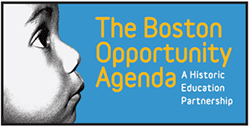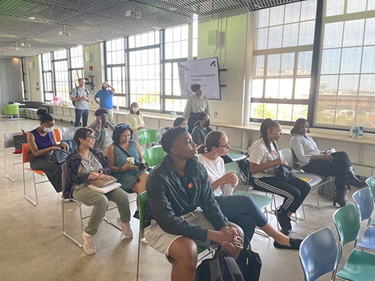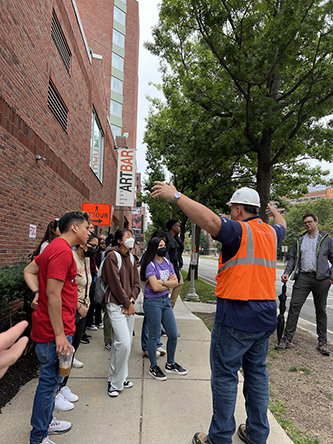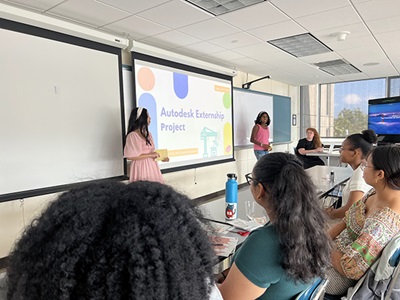2022 Success: Architecture, Construction, Engineering (ACE) Mentor Program
Through a cross-industry partnership amongst Generation Success-aligned programs, Autodesk, Elkus Manfredi Architects, Nitsch Engineering, and Gilbane Building Company, the ACE Mentor Greater Boston Program held its first hybrid online and in-person cohort in August 2022 with eight student interns from across the Boston area. Students and industry professionals collaborated to create solutions to address Boston’s current labor shortage in the construction field – a critical problem impacting many different industries and the future of the workforce.
Together, the high school students, comprising a diverse group from four Boston Public Schools, one Boston private school, one Boston charter school, as well as public schools in Brookline and Somerville, researched key roles in AEC (architecture, engineering, and construction) that are most impacted by workforce shortages and then came up with innovative ideas to better market these career opportunities to young people.
Students engaged with each other, shared feedback as peers, and gained insights from their industry mentors. Industry mentors, alongside educators from the Boston Public Schools, provided educational workshops about AEC careers and concepts such as sustainable design, green building and technology integration.
“We designed this program to address not only the workforce shortages that our customers are facing, but also to highlight the vastness of opportunities that exist for young people to find meaningful and prosperous careers in the construction industry,” said Kellyanne Mahoney, Youth Programs Specialist at Autodesk. “For many roles in construction, hiring managers are looking for candidates who can prove their mastery of specific skills. They also emphasize the importance of experience and competency in non-technical skills.”
To conclude the program, students demonstrated their communication skills by presenting their projects at Wentworth Institute of Technology and sparking a discussion to inspire others to care about this issue and take action. Students presented ideas for engaging events and community engagement opportunities to increase young people’s awareness of AEC career paths, highlighting the ability to make positive impacts on their local communities through social justice and sustainability.
As a result of these presentations, students earned a communication digital skill badge from Boston After School and Beyond to feature on college applications and/or job resumes. This was the first time Autodesk used this communications badge to develop the curriculum for an internship program. Autodesk plans to replicate the program’s success next year to continue supporting young people and preparing them for college, career and life after high school.
“By framing the program around the students demonstrating job readiness in communications disciplines, they are leaving us with a critical skillset that is applicable to almost any AEC role, as well as a mindset toward continuous learning,” said Mahoney. “As facilitators of learning, we were also more deliberate about building opportunities for discussion into each day’s program and making the teaching process more of an open dialogue with the students. This approach helped students share their thought process, become excited about these roles, and start to see themselves in AEC careers.”
Generation Success Opportunities
Digital Ready
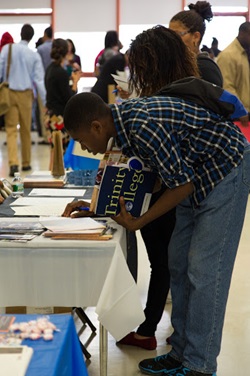
Interested in computer science as a growing field in Boston? Digital Ready is offering a citywide AP Computer Science A studio that allows any high school student – regardless of the high school they attend or the neighborhood they live in – the opportunity to learn more about computer science. As part of the yearlong studio, students will receive four early college credits and emerge with a digital portfolio to obtain a summer tech apprenticeship with The Boston Private Industry Council. Check out more about Digital Ready here!
Grlz Radio
In the form of a remote learning co-op, Grlz Radio is seeking to teach young people about the entertainment industry! Alongside Northeastern University, Boston College and Boston University, Grlz Radio is recruiting high schools who want to learn more about fun, marketable and transferable skills, like media broadcasting, journalism, social media management. Upon successful completion of the program, high school juniors and seniors have the opportunity to stay on board or apply for part-time, paid positions at Spark FM. Learn more about Grlz Radio here!
I-USE Lab
I-USE Lab at Boston College has embarked on a pilot program to engage entire families in science and engineering learning experiences! The program trains high school youth to serve as food justice leaders and mentor families who are provided with their own hydroponics unit (to grow plants) through low-cost physical computing. In partnership with Brighton High School. Neighborhood House Charter, Dearborn STEM Academy and Gardner Pilot, their approach helps entire families learn about automation, coding and electronics to grow their own food. Check out the program here!
Lesley University
Lesley University is proposing a series of online workshops to help young people in Boston develop visual literacy skills through exposure to contemporary BIPOC photographers! The proposed workshops hope to explore racial justice through both online and offline exercises about image analysis and BIPOC self-representation, and expose students to skills aligned with design, photography, digital content and image-making. Lesley’s College of Art and Design currently partners with public and charter high schools in Cambridge and Somerville, and offers studio and discipline-specific workshops. Learn more about Lesley University’s programs here!
Neighborhood Design Project
In partnership with the Department of Human Service Programs, Neighborhood Design Project is dedicated to teaching young people – and adults who support and guide young people – design skills in an accessible, engaging and meaningful way. With the help of mentors and coaches, who are leaders in the design and innovation economies, teens learn strategies for problem identification and empathetic research methods before engaging with their communities to understand problems, identify livability challenges, and use creative problem solving to explore solutions. The program culminates with a presentation showcase and an exhibition of the work! Check out the Neighborhood Design Project here!
NFTE
Alongside Boston’s high schools, community colleges, and corporate partners, NFTE is launching an innovative new Credit-For-Career initiative! NFTE envisions every Boston High School student will have the opportunity to create and launch their own business, and receive executive coaching from a cadre of corporate partners. NFTE students across Boston will earn college credit to local community colleges upon completion. Imagine, in a few years’ time, thousands of students across the city will graduate with their first business plan in hand, a robust internship experience, and college credits! Learn more about NFTE’s program here!
